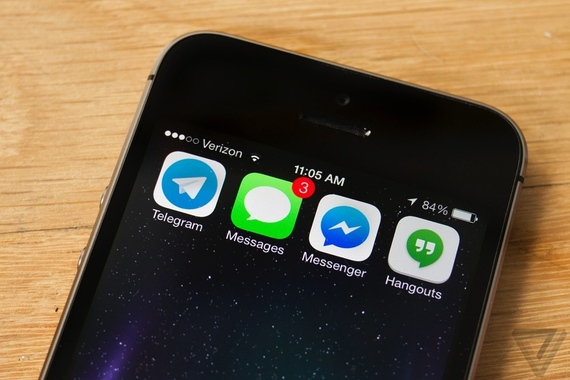It started casually enough. A group of Young Global Leaders, a community established by the World Economic Forum, were going to the annual conference in Davos in Jan 2014. With over one hundred of the community present, spread out over kilometers of a snowy Swiss town, it can be very hard to coordinate gatherings. So a few of us decided that we needed a way of helping each other figure out this place, the experienced hands helping the newbies find their way around this incredible venue.
In the past we used to rely on a few known friends who always seemed to be invited to the best events. We would then send a text to an individual to find out what the event was like, specifically trying to work out whether it was worth the hassle of moving venue to get to a better place. More often than not the person did not reply until the next morning, and in any case, after a week of texting and calling, it was not unheard of to end up with a $500 phone bill for the week.
I am a great believer in the saying that 'the future is young'. I spend a lot of time with folks in their twenties, learning what new tricks that they are using with technology and communication in general. Just before Davos started, I learned about an app called Whatsapp, great for free text messaging with the added bonus of group messages.
It turns out that great minds think alike, and just before Davos started the YGLs had set up a group chat. As an extremely social bunch, we all wanted to join in and that meant that we hit our first two problems within 2 days: group size limits and poor group administration.
Whatsapp only allowed 50 telephone numbers in a group, and as some people had two accounts, that meant that in practice only 40 people could get in. Moreover, the group administrator had to do all the user management without the possibility of delegating the work to anyone else. This meant that the first one who had a small idea for making the group was on the hook for being bugged by tons of people wanting to get in.
YGLs are a creative bunch, and we managed to overcome the user group limit with an ingenious work-around. And we solved the group administrator task with, in retrospect, turned out to be an incredibly wise move. One YGL decided to manage all the groups, not just the first one, on behalf of the entire community.
We soon ended up with several YGL groups. There was the mega-sized 'Friends' group. There was the 50-person capped 'Core Group'. And then a bunch of spin-off groups, such as 'YGL Parents' and other event-specific groups.
Already it was amazing to see that so many busy influential people were taking time out of their day to prioritize reading and responding to these group messages. At the same time the Facebook group for the same YGL community dropped dramatically in posting volume. The few posts there were began to receive no comments and few 'Likes'. It just did not seem to be where the action was at.
And the discussions in the groups went deep into lots of different topics, both observations on current events through to more general discussions on world topics.
And yet, with a seemingly unsurmountable loyalty built up to the app over those ten months, within just a couple of weeks the activity had died down to almost zero. Instead we were all migrated over to Telegram.
It started innocuously enough. One person, the group administrator, suggested we should look at a new platform, one that was 'much better than Whatsapp'. That is hardly a compelling sales pitch, and initially that suggestion was ignored. Better to keep everyone on the platform we have, rather than take a risk of splitting the group dynamic and ending up with discussions in two places.
Gradually a few of the benefits of switching were exposed through debate. The Telegram app was meant to be more secure that Whatsapp. It had a lot more features. But still, surely our goal was to communicate, and how would a new app make that better than our currently great experience?
At the same time there was a push for WeChat as a replacement. The YGL community was heading to China in Sept 2014 for their annual summit at the Great Wall of China, and WeChat, as a Chinese messenger app, felt appropriate. It also offered lots of cool features that we Whatsapp users had never dreamed of before, such as being able to call a person for free using the same application.
But it did not pick up. We could get 30 people in a WeChat group, but the conversation was largely absent. And Whatsapp conversations seemed to just continue to grow in substance and volume.
The real push to move from Whatsapp came when new special interest groups were suggested in our main forum. A proposed group on 'Careers' was likely to instantly attract 40 people, which meant that over time it could naturally grow to 80... which would have blown the group size limit in Whatsapp. Our hack to get more users was not going to work for lots of groups, and it made no sense to kick of an initiative that was going to end up with problems almost from Day One.
So, with the help of the group administrator, the new wannabe leaders agreed to put their new groups on Telegram only. A few of us had tried out Telegram and had quickly grown to love the app. It was slick looking, had more functionality than Whatsapp, held the promise of more security, and had a computer version. We did not quite know what that meant when we decided to like that feature, but a short download later and we found that we could type more without having to hunt and peck letters on our smartphones.
Over the next week there were a series of messages from the group admin that everyone should 'check out Telegram'. The debates on whether we should use it quickly shifted to becoming about how we should use it. On Telegram itself, a welcome message was sent out when a new YGL joined. We quickly saw that the freedom for anyone to add anyone created more openness, and some of our YGL friends who had been accidentally excluded from Whatsapp now were able to rejoin our community.
From then on, messages went out into Whatsapp that the groups would be closing on a specific date. With no complaints, the conversations almost immediately died out, and sprung back up on Telegram. Even the last hold-out, the original mega-group, has practically died despite being officially available till the end of 2014, its life transported into the new system.
What is interesting is how ephemeral the success of Whatsapp has been for us, and how short lasting messaging apps are likely to be in the future. Facebook has become a store of evergreen content, messages that need to persist over days and weeks. Whatsapp and Telegram are lousy at permanent content but great at short term inspiration, amazing at capturing moments from our community wherever they take place around the world.
We are not afraid of putting jokes, personal insights and fun photos into the messaging spaces. In Facebook they can persist forever, but in our new world these rapidly disappear. It gives one a feeling of presence in the system, checking in after a night's rest to find 40+ new messagings in your group.
Our experience highlights a huge challenge for messaging service providers, and also for the telcos who have relied on text messaging revenue as a source of profits. My 40-year old generation are relatively speedy adopters of technology. We have quickly jumped into this new world. We use traditional SMS text messages infrequently and are starting to use these platforms to make calls, using WiFi or 3G access when travelling. We are also using these platforms to share single messages to mass groups. It is so much easier than any other way of communicating.
At the same time our loyalty is to each other, not to a platform. No doubt we all will maintain our Whatsapp accounts, just as we have done with Viber and other platforms. We may only use those platforms for a couple of conversations, but they are important enough to have us not delete them from our phones. But we are prepared to migrate en masse when a better solution comes along, one that helps enough of a core group to have us all move.
In this light, one has to question the wisdom of Facebook's $19 billion acquisition of Whatsapp. They may be arguing that they are buying into an established brand and huge userbase, but these are fickle users who have been conditioned to getting a free service. Perhaps Whatsapp will take its place in the hall of Facebook shame with other apps like Facebook Poke and Facebook Camera, famous copycat apps for 30 seconds.
What I do know is that these collaboration apps, when used in a community, offer huge benefits over all the tools we have had before. It allows us to connect and feel part of something bigger than ourselves. We learn new things faster, and get a sense of what is going on without feeling pressured to reach out and bug people for contact. These are already remarkable apps... and I wonder what we will all be using next year.
